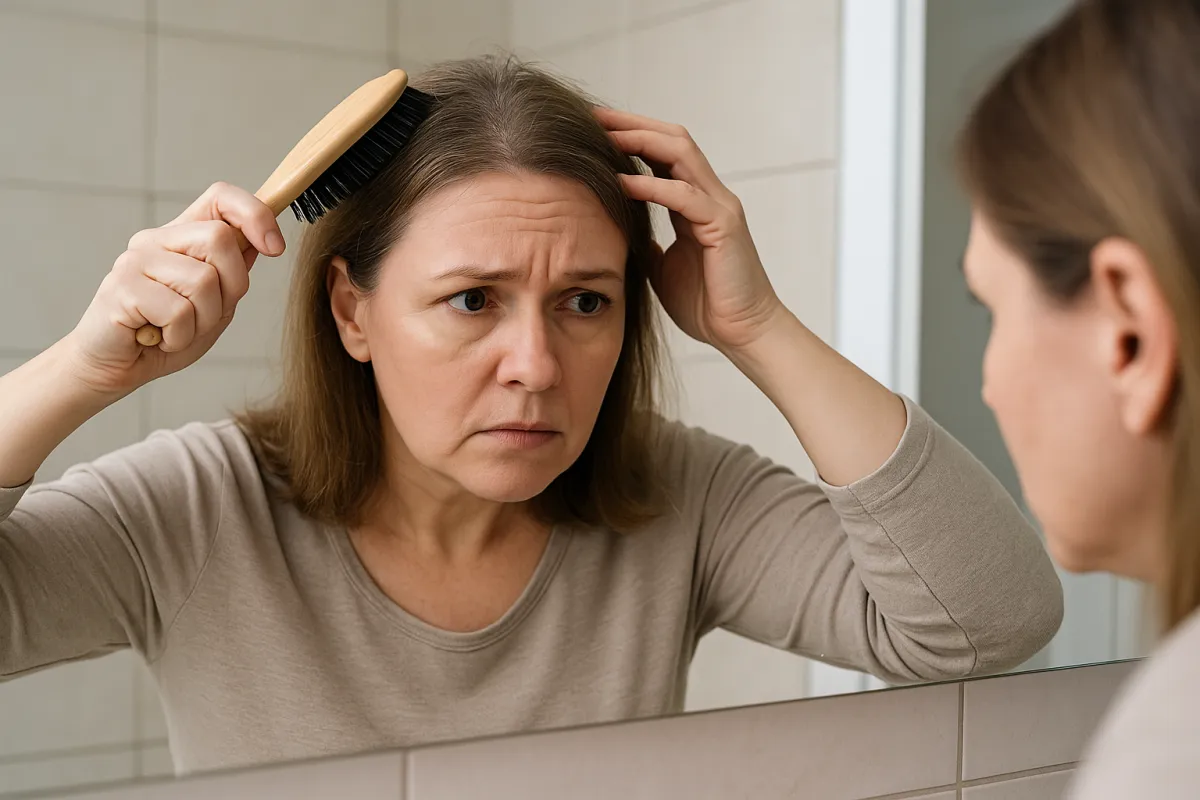
How Hormones Affect Your Hair: What Every Woman Needs to Know
How Hormones Affect Your Hair: What Every Woman Needs to Know
You’re not imagining it. That thinner ponytail, extra shedding in the shower, or that patch that just doesn’t look quite right — it’s happening. And no, you’re not vain, dramatic, or just "getting older." There’s a reason your once-thick, bouncy hair has suddenly betrayed you. Spoiler alert, it starts with your hormones.
At Everyday Wellness, we hear this story from women all the time. You’ve invested in the pricey shampoos, tried the miracle vitamins your favorite influencer swears by, and you’ve Googled "why is my hair falling out" more times than you’d like to admit. But here’s the truth — if you're not looking at your hormones, you’re missing the root cause (pun fully intended).
Many women assume hair thinning is just a part of aging. We’re told to accept it. But what if that’s not the whole story? What if your hair is actually a mirror, reflecting what’s happening inside your body? Because it is.
Let’s pull back the curtain on hormonal hair loss and, more importantly, what you can actually do about it.
The Hair-Hormone Connection No One Talks About
Hair loss isn’t just a surface-level problem. It's often a signal that your body is out of balance — especially hormonally. Millions of women experience some degree of hair loss, but conventional solutions often overlook the internal culprits. Here are the hormonal players wreaking havoc on your strands:
1. Estrogen: Your Hair’s Best Friend
Estrogen is like the fairy godmother of hair growth. It helps keep your strands in the growth phase longer, meaning fuller, thicker hair. But during perimenopause and menopause, estrogen levels drop. The result? More follicles jump into the shedding phase, and regrowth can slow down dramatically. You’re left with hair that feels finer, thinner, and not quite "you" anymore.
2. Testosterone & DHT: The Sneaky Villains
Yes, women have testosterone too. But when levels are imbalanced — or when testosterone converts to dihydrotestosterone (DHT) — it shrinks your hair follicles, especially around the crown and temples. You might notice a wider part line, receding hairline, or hair that feels wiry and sparse.
3. Thyroid Hormones: The Silent Saboteurs
Your thyroid controls metabolism and plays a key role in hair cycle regulation. Low thyroid (often seen in hypothyroidism or Hashimoto’s) slows everything down — including hair growth. You might notice shedding, brittle strands, or hair that just won’t grow past a certain point.
4. Cortisol: The Stress Hormone Wreaking Havoc
Stress doesn’t just mess with your mood — it throws off your entire hormonal balance. Elevated cortisol can interrupt your body’s ability to regulate estrogen, testosterone, and thyroid hormones. That means more hair in your brush and less growing on your head.
Sound Familiar? Here’s What Hormonal Hair Loss Looks Like
You don’t need a biopsy or microscope to know something’s off. If you’ve noticed any of the following, your hormones could be playing a role:
Thinning at your part line or temples
Excess shedding in the shower or your hairbrush
Slower regrowth after shedding
Hair that feels limp, lifeless, or weaker than before
These aren’t just cosmetic annoyances — they’re signs that your body is asking for help.
Why It Feels So Personal (Because It Is)
When your hair changes, it can feel like your identity is shifting too. That once-confident woman in the mirror now hesitates to wear her hair down or skips photos altogether. You start avoiding mirrors. You hide under hats or ponytails. And worst of all — you blame yourself.
"Maybe I’m not eating clean enough."
"Maybe I need a stronger shampoo."
"Maybe I’m just overreacting."
You’re not. This isn’t about vanity. It’s about feeling like yourself again. And no amount of product will fix an internal imbalance.
What Happens If You Ignore It?
Hormonal hair loss doesn’t usually reverse on its own. In fact, the longer it goes untreated, the more likely it is that hair follicles shrink to the point of no return. That means regrowth becomes much harder — and sometimes impossible — later on.
You may also notice that hair changes are just the beginning. Fatigue, mood swings, weight gain, and brain fog often tag along, signaling that your hormones are out of sync across the board. It’s not just your hair that’s struggling — it’s your whole system.
And here’s the kicker, the more you stress about it, the more cortisol rises, making the problem worse. It’s a vicious, exhausting cycle.
So, What Actually Works?
At Everyday Wellness Wichita, we don’t believe in quick fixes or one-size-fits-all solutions. Why? Because they don’t work. Instead, we focus on getting to the root cause of your symptoms.
Our holistic approach includes:
Comprehensive Hormone Testing to identify imbalances in estrogen, testosterone, thyroid hormones, and cortisol
Bio-identical Hormone Replacement Therapy (BHRT) to safely restore optimal hormone levels and reduce DHT conversion
Non-invasive Hair Restoration Treatments, like ultrasound therapy and nutrient-rich scalp support
Lifestyle and Nutritional Coaching to support your body’s natural ability to heal from the inside out
This isn’t about chasing vanity. It’s about giving your body what it needs to thrive — so your hair can flourish, too.
Let’s Talk Solutions: What You Can Start Doing Now
Understanding your hormones is the first step, but here’s how to take action:
Track Your Symptoms: Keep a simple log of your hair changes, energy levels, and cycle patterns. These clues help paint a bigger picture.
Don’t Self-Diagnose: Avoid the trap of random supplements or internet solutions. What works for one woman may not work for you.
Book Hormone Testing: This is the most important step. You can’t fix what you don’t measure.
Explore BHRT and Hair Therapy Options: Once you know your baseline, we tailor a plan that works for your body.
Support Your Stress Levels: Sleep, breathwork, gentle exercise, and mindset work help regulate cortisol and improve overall hormone function.
The Benefits Go Beyond Your Hair
As your hormones rebalance, the transformation often goes deeper than just fuller locks. Many of our clients experience:
Renewed confidence and joy in daily life
Increased energy and clearer thinking
A sense of control over their health again
And yes, they love what they see in the mirror — but more importantly, they feel like themselves again.
Don’t Wait Until It’s Worse
If you’ve been brushing off your symptoms or telling yourself it’s “just aging,” it’s time to rethink that narrative. The cost of inaction isn’t just more hair on your pillow. It’s months or years of missed confidence, energy, and emotional peace.
Every day you wait is another day your body is stuck in imbalance. And the longer you wait, the harder it becomes to reverse the damage.
But here’s the good news — you don’t have to do this alone.
Ready to Get to the Root of It?
Your hair is trying to tell you something. We’re here to help you listen.
Book your consultation today at everydaywellnesswichita.com and take the first step toward healthy, thriving hair and a body that feels in balance again.
You deserve to feel vibrant — inside and out.


